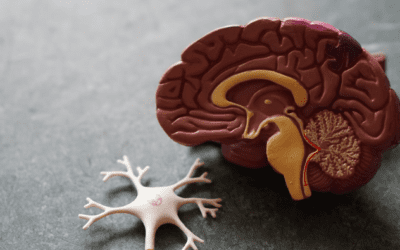I’m going to ask you to do something a little weird right now. Ready?
Picture your favorite, most decadent food.
Maybe it’s a thick slice of rich chocolate cake … or a hot slice of cheesy pizza straight from the oven. Maybe it’s buttery lobster or a juicy burger stacked high with toppings.

Did your mouth start to water?
What you might not have noticed is that your stomach also started producing digestive juices to prepare for the food you were just thinking about. That’s the gut-brain connection in action—and it’s more powerful than you might realize.
This connection between your brain and your digestive system doesn’t only involve thoughts of food. It includes emotions—especially stress—and how those emotions impact your gut health on a very real level.
Table of Contents
The Gut-Brain Connection: Why Stress Impacts Digestion
You’ve probably heard phrases like “gut feeling” or “butterflies in your stomach.” Those aren’t just metaphors. Your gut and your brain are deeply intertwined through a network called the gut-brain axis, which includes:
- The central nervous system (your brain and spinal cord)
- The enteric nervous system (the nervous system of your gastrointestinal tract)
- The vagus nerve, which acts like a communication highway between the two
When you feel stressed, your brain sends signals to your gut—and your gut reacts. Sometimes that shows up as stomach cramps, bloating, indigestion, or changes in your appetite. Other times, the symptoms are more chronic, like ongoing constipation, diarrhea, or even long-term digestive disorders.
How Stress Affects Your Gut Health
Here’s what stress can do to your gut:
1. Slows Down Digestion
Stress diverts energy away from non-essential systems, like digestion, so you can “fight or flee.” Your body produces more adrenaline and cortisol, which can delay gastric emptying and reduce blood flow to your digestive organs. This can lead to symptoms like bloating, gas, or constipation.
2. Speeds Up Digestion
For some people, stress triggers the opposite: it speeds things up. That means food moves too quickly through your system, which can cause diarrhea or cramping. Either way, digestion becomes inefficient.
3. Impacts Gut Microbiome Balance
Stress affects your gut microbiome—the trillions of beneficial bacteria living in your intestines that play a vital role in your health. Chronic stress can reduce microbial diversity, lower the population of “good” bacteria, and create an environment where harmful bacteria thrive. This imbalance can affect everything from immunity to nutrient absorption to mood regulation.
4. Increases Inflammation
Stress increases inflammation throughout the body, including in the gut. Over time, chronic inflammation can damage the intestinal lining and contribute to leaky gut syndrome, where toxins and undigested food particles leak into the bloodstream and trigger immune responses.
5. Exacerbates GI Disorders
Conditions like irritable bowel syndrome (IBS), gastroesophageal reflux disease (GERD), and ulcers are all linked to stress. While stress doesn’t always cause these conditions, it can significantly worsen symptoms and reduce your quality of life.
Signs Your Gut Health May Be Affected by Stress
Not sure if stress is taking a toll on your gut? Here are some common signs to watch for:
- Frequent indigestion, heartburn, or acid reflux
- Changes in bowel habits (constipation, diarrhea, or alternating between both)
- Bloating or gas after meals
- Loss of appetite or emotional eating
- Nausea, especially in high-stress situations
- Increased food sensitivities or intolerances
- Fatigue or brain fog after eating
If these sound familiar, it may be time to take a closer look at your stress levels—and how they’re impacting your overall health.
How to Reduce Stress and Support Gut Health
The good news? There are simple, powerful steps you can take to reduce stress and support your digestive health. Here are a few to start with:
1. Take a True Day Off
If possible, schedule one day a week where you do nothing productive. Go for a walk, read a book, explore nature, or do something creative. Giving your nervous system time to reset is essential.
2. Practice Deep Breathing or Meditation
Just 5–10 minutes a day of deep breathing or guided meditation can calm your nervous system and improve digestion. Apps like Calm, Insight Timer, or Headspace are great starting points.
3. Reframe Negative Thoughts
Notice when your thoughts spiral into worry or overwhelm. Pause and ask yourself: Is this thought helpful? True? Necessary? Then intentionally shift to a more empowering or calming thought.
4. Strengthen Your Social Connections
Spending time with loved ones isn’t just good for the heart—it’s good for your gut. Social connection reduces cortisol levels and increases oxytocin, the “feel-good” hormone.
5. Guard Your Time
Start saying “no” to commitments that drain you. Protecting your boundaries is a form of self-care, and it frees up energy for rest and joy.
6. Move Your Body
Exercise—whether it’s a walk, yoga, or strength training—boosts circulation, helps regulate your nervous system, and promotes healthy digestion.
7. Eat a Gut-Friendly Diet
Support your microbiome by eating fiber-rich foods (like fruits, veggies, and legumes), fermented foods (like yogurt, sauerkraut, kimchi), and prebiotics (like garlic, onions, and bananas). Avoid ultra-processed foods and added sugar when possible.
8. Try Gentle Yoga
Rather than forcing yourself into power poses, focus on gentle, restorative yoga that helps you connect with your body and release tension. Even five minutes of child’s pose or legs-up-the-wall can make a big difference.
It’s All Connected
Once you start connecting the dots between your emotions, your habits, and your physical symptoms, you begin to see how everything is connected.
Stress management isn’t just about calming your mind—it’s about healing your gut, improving your energy, supporting your immune system, and protecting your long-term health.
So if you’ve been pushing through your days, convincing yourself that stress doesn’t affect you … take a breath.
Then take one small step to support your nervous system and your digestion. Your body—and your gut—will thank you.
References:


















